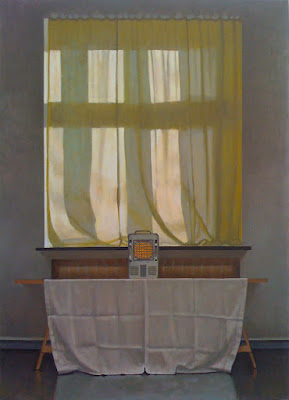
Immediately on my return from Hamburg, we (finally) had a house guest here in Essen. My nephew, Tom, is on Spring Break from the University of Washington and stopped by on his way from Prague to Vienna. You might be wondering if maybe a mandatory course in Geography isn't in order for the Huskies, but in fact, Eurail Passes would seem to make that kind of thinking obsolete.
 There are two United Nations World Cultural Heritage Sites in our neighborhood: Zeche Zollverein, a really cool coal mine, and the Cologne Cathedral. We decided to bring Tom to both of them.
There are two United Nations World Cultural Heritage Sites in our neighborhood: Zeche Zollverein, a really cool coal mine, and the Cologne Cathedral. We decided to bring Tom to both of them.I get down to Cologne regularly and it's only a short hop from Essen. For this visit I wanted to finally see the new Kolumba Museum. Built on the ruins of St. Kolumba, a church destroyed in World War II, the Kolumba is the art museum of the Christlichen Kunstverein für das Erzbistum Köln. When I was growing up in the diocese of Bridgeport, I don't remember hearing about our Bishop having an art museum, so I was curious about Kolumba. I'd heard that it combines an excellent collection of art from the Middle Ages with both modern and contemporary pieces. But whenever I go to Cologne, it seems I have some business to attend to and the museum is always too low on the priority list to merit a visit. This time I planned to make it my first stop.

We took a few wrong turns getting there but ultimately arrived at what I feel is a very impressive building. And of course, the museum was closed. With every museum in Western Civilization closed on Monday, the Catholic Archdiocese of Cologne opted to be open on Monday and closed on Tuesday. And the Pope wants to know why church attendance is down.
We recovered rapidly and took off for a visit to the former headquarters of the Gestapo in Cologne. But my mind came back to the seemingly paradoxical alliance between contemporary art and the Roman Catholic Church later in the day when we made it to the Kölner Dom. The newest addition to the cathedral, which was begun in 1248 and only completed in 1880, is a stained glass window designed by Gerhard Richter. Richter is a progressive contemporary artist and his randomly generated design of 11,500 squares of glass was criticized by Cardinal Meisner when it was unveiled. Richter, though not particularly religious, claims strong spiritual beliefs, and presumably he feels they are imbedded in his window. I doubt if anyone would deny the window's beauty, but I feel that random organization (which might well be an oxymoron) is the antithesis of a structure imposed by the supreme being. Right?
Luckily no one is really interested in my point of view on these matters and when we visited the Zeche Zollverein earlier today, no such complicated philosophical questions were posed. We admired the amazing Bauhaus inspired buildings. We marveled at the scope of the project and at the audacity of humans to contemplate building anything so massive. And we contrasted the Zeche, closed after only 55 years in operation, with the Dom, where they're still buying new windows after 761 years in business.

























